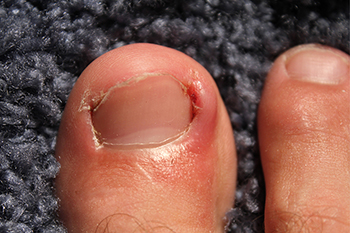
It is important to take care of wounds on the feet immediately. These can come from a variety of sources, including ingrown toenails. This is a condition that develops when the toenail grows into the skin surrounding it instead of over it. The big toe is most likely to be impacted by this ailment. Everyone is at risk of developing ingrown toenails, particularly teens who often have sweaty feet from sports participation. It may also affect elderly people whose nails thicken as time passes. Ingrown toenails can occur from cutting toenails improperly, or if they have an irregular shape or are curved. Additionally, wearing shoes or socks that compress the toes can lead to getting an ingrown toenail. This problem can cause pain and swelling. Complications, namely infections from ingrown toenails, are most apt to happen to those with diabetes or conditions involving poor circulation. An infection from an ingrown toenail might present as red, bleeding, oozing pus, and an overgrowth of skin around the toe. Left untreated, this type of infection can impact the bone in the toe and lead to foot ulcers or open sores. If you have an ingrown toenail that is becoming worse or possibly infected, it is suggested that you see a podiatrist as soon as possible who can provide a proper diagnosis and treatment.
Wound care is an important part in dealing with diabetes. If you have diabetes and a foot wound or would like more information about wound care for diabetics, consult with one of our podiatrists from Sutera and Jones Surgical Podiatry. Our doctors will assess your condition and provide you with quality foot and ankle treatment.
What Is Wound Care?
Wound care is the practice of taking proper care of a wound. This can range from the smallest to the largest of wounds. While everyone can benefit from proper wound care, it is much more important for diabetics. Diabetics often suffer from poor blood circulation which causes wounds to heal much slower than they would in a non-diabetic.
What Is the Importance of Wound Care?
While it may not seem apparent with small ulcers on the foot, for diabetics, any size ulcer can become infected. Diabetics often also suffer from neuropathy, or nerve loss. This means they might not even feel when they have an ulcer on their foot. If the wound becomes severely infected, amputation may be necessary. Therefore, it is of the upmost importance to properly care for any and all foot wounds.
How to Care for Wounds
The best way to care for foot wounds is to prevent them. For diabetics, this means daily inspections of the feet for any signs of abnormalities or ulcers. It is also recommended to see a podiatrist several times a year for a foot inspection. If you do have an ulcer, run the wound under water to clear dirt from the wound; then apply antibiotic ointment to the wound and cover with a bandage. Bandages should be changed daily and keeping pressure off the wound is smart. It is advised to see a podiatrist, who can keep an eye on it.
If you have any questions, please feel free to contact one of our offices located in Media, Glen Mills, Riddle Memorial Hospital, and Concordville, PA . We offer the newest diagnostic and treatment technologies for all your foot care needs.
